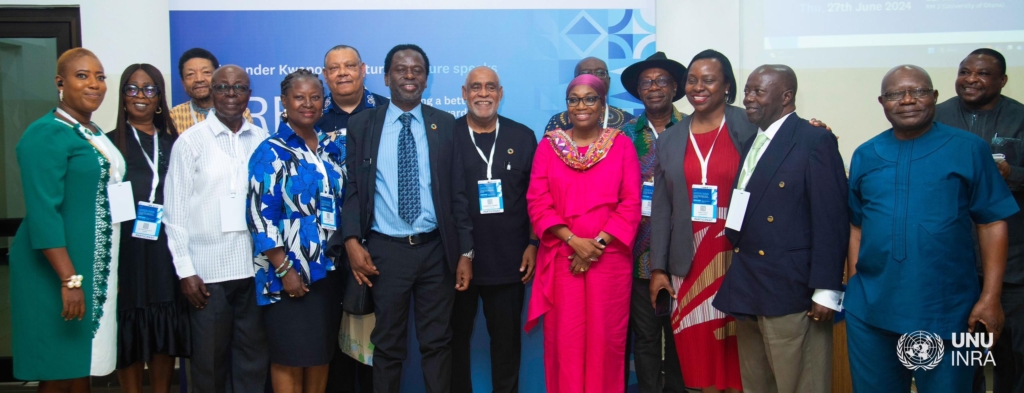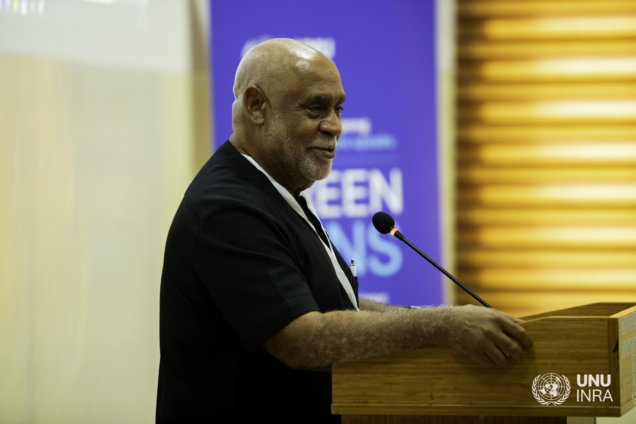Resident Coordinator of the United Nations in Ghana, Charles Abani is urging countries worldwide to leverage their unique comparative advantages in addressing the global climate crisis.
This call comes as a movement of environmental activists and other actors from across Africa, which emerged at the COP27 Climate Conference, continues to push for the largest polluters, particularly wealthy Western nations, to pay reparations for damages and losses to the continent.
They are also advocating for global climate change policies that prioritize the needs of indigenous people.
However, industrialized nations have yet to agree on a framework to create and implement an aid package for climate mitigation in developing nations.

During a lecture at the University of Ghana's Cedi Hall on the theme "Fostering a Better Dialogue Towards Sustainable, Inclusive Natural Resource Governance," Mr Abani emphasized that all countries face the same challenge and must bring their unique comparative advantages to the table.
The event was organised by the United Nations University – Institute for Natural Resources in Africa (UNU-INRA).
He noted that developing countries, while having lower emissions, are rich in natural resources needed for green transitions. In contrast, developed countries have the technology and resources to facilitate the transition but are burdened with the costs associated with high carbon-dependent models.
Both developed and developing countries will have to bear the costs. Historical emitters must retrofit and transition more, while those with higher impacts need to adapt more as well as grow greener”. Mr. Abani noted.
The UN Chief in Ghana premised his argument on the emerging trend where Finance challenges which most countries are challenged with while urging the world to adopt an investment mindset.
According to him “We must adopt win-win approaches and a different mindset to achieve breakthrough transformation. Sustainable interdependence and equitable approaches are essential. Developed countries need to move away from narrow interests, pursue equity-based models, and address responsible production and consumption”.
He further explained that developing countries must take responsibility, ensure policy congruence and leverage indigenous knowledge and technology, including Artificial intelligence.
With the deployment of the right capacities, Charles Abani is hopeful that there’ll be Sustainable and Inclusive Natural Resource Governance.
Latest Stories
-
Amakye Dede’s ‘Sufre Wo Nyame’ is a gospel song – Mabel Okyere
12 minutes -
Police Security withdrawn from EC Chair Jean Mensa’s residence
28 minutes -
GoldBod to transact only at Interbank Forex Rates – Sammy Gyamfi
42 minutes -
KNUST attracts and partners over 40 industry giants in hold career fair
54 minutes -
GWL to interrupt water supply in north-eastern Accra on Friday
56 minutes -
Struggling with sex in marriage? Uncle Ebo Whyte offers practical solutions
1 hour -
Is Hon. Johnson Kwadwo Asiedu Nketia the General who knows the Battlefield?
2 hours -
Burna Boy makes Executive Producing Debut with Pan‑African Thriller “3 Cold Dishes”
2 hours -
UPSA condemns staff misconduct in viral altercation with student
2 hours -
Mahama demands strong and independent judiciary
2 hours -
Medical facilities in Ahafo Region hail NHIA for prompt payment of claims
2 hours -
Legendary Nigerian goalkeeper Peter Rufai passes away
2 hours -
Mahama urges judiciary to align justice with people’s needs
3 hours -
West African cities embrace risk-informed planning in new urban resilience workshop series
3 hours -
Everybody needs a good Nigerian friend – Lucy Quist
3 hours

